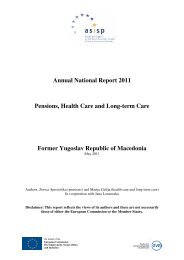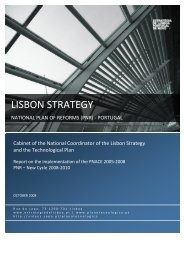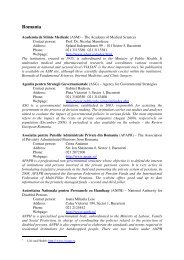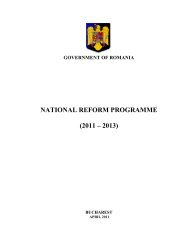National reform programme 2008-2010 Malta - European Commission
National reform programme 2008-2010 Malta - European Commission
National reform programme 2008-2010 Malta - European Commission
You also want an ePaper? Increase the reach of your titles
YUMPU automatically turns print PDFs into web optimized ePapers that Google loves.
This process aims to facilitate the transition process and provide an inclusive educational<br />
experience for all pupils, thereby developing their confidence and self-esteem. This measure<br />
addresses the reduction of early school leavers by increasing retention rates.<br />
Promoting literacy skills in young people<br />
While <strong>Malta</strong> has developed its systems of data collection and is analysing the level of reading<br />
skills in primary and secondary schools on a national level, <strong>Malta</strong>’s participation in the<br />
collection of international comparative data is essential. In this respect <strong>Malta</strong> is seeking funds<br />
to be able to participate in international surveys such as PIRLS and PISA which will provide<br />
valid indicators.<br />
Within the new College set-up students at secondary level, lacking basic skills including<br />
literacy, are being provided with customised <strong>programme</strong>s to address their needs. Such<br />
<strong>programme</strong>s supplement existing measures at both primary and secondary levels. This will<br />
ensure that all young people leave compulsory education functionally literate. In addition, a<br />
policy is being introduced in <strong>2008</strong>/09 to ensure early identification of pupils who are facing<br />
difficulties in acquiring literacy skills in primary schools and a strategy aimed at subsequent<br />
early intervention is accompanying it thus ensuring the acquisition of literacy competencies by<br />
the end of the primary cycle.<br />
An employment strategy to increase capacity building in the student services sector is also<br />
underway so as to offer support to those students facing educational challenges or are at<br />
some form of educational disadvantage.<br />
Increasing the number of graduates in Science and Technology<br />
At compulsory education level, measures are being undertaken with a view to encourage<br />
more students to take up courses in Mathematics, Science and Technology at tertiary level.<br />
These measures include:<br />
• the refurbishment of Science Laboratories: nurture a positive attitude to science and<br />
technology and develop inquiry-based learning and scientific skills among secondary<br />
school students by refurbishing and upgrading science and technology laboratories By<br />
<strong>2010</strong>, all science laboratories and a number of technology laboratories in all state<br />
schools will be upgraded. This measure will contribute towards increasing the number<br />
of students opting for and obtaining certification in the sciences.<br />
• strengthening science teaching at primary and secondary level: the current curriculum<br />
review is also looking into the teaching and learning of science at both primary and<br />
secondary levels with a view to strengthen science within compulsory education. It is<br />
envisaged that concrete measures will be undertaken from 2009 following the outcome<br />
of this review.<br />
In addition, these actions will be complemented with significant investments at MCAST, the<br />
Junior College and the University of <strong>Malta</strong> to upgrade teaching laboratories. In particular, the<br />
University of <strong>Malta</strong> is now in a position to equip a number of specialist laboratories, ranging<br />
from biology, chemistry, biotechnology, physics, earth sciences, pharmacology, electronics,<br />
and ICT amongst others to support teaching and research at undergraduate, postgraduate,<br />
and postdoctoral levels.<br />
Developments in further education<br />
Further education in <strong>Malta</strong> includes all post secondary institutes and colleges which provide<br />
general academic teaching or vocational education and training leading to <strong>National</strong><br />
Qualifications Framework (NQF) level 5.<br />
<strong>Malta</strong> <strong>National</strong> Reform Programme <strong>2008</strong>-<strong>2010</strong> - 74 -







